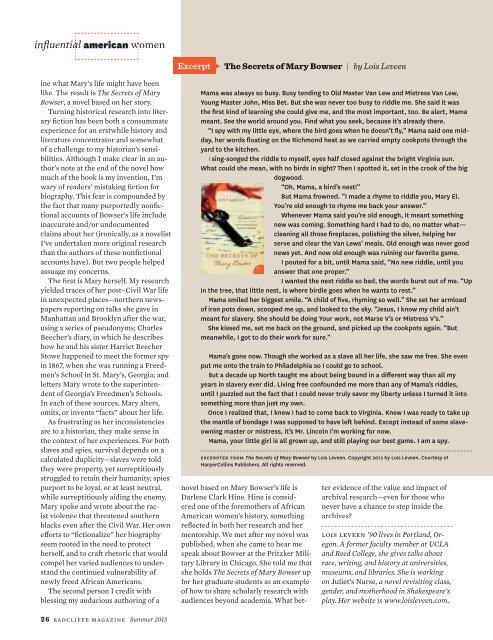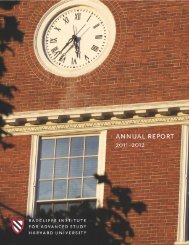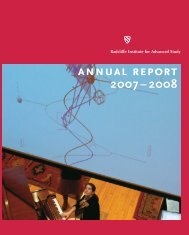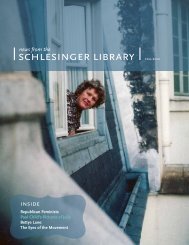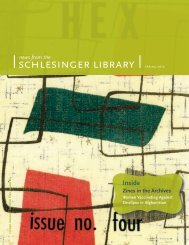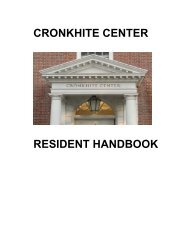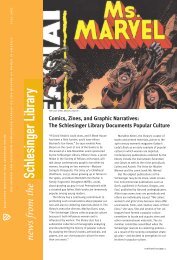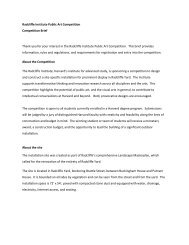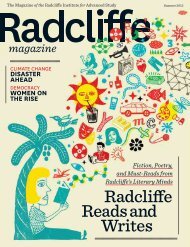Download - Radcliffe Institute for Advanced Study - Harvard University
Download - Radcliffe Institute for Advanced Study - Harvard University
Download - Radcliffe Institute for Advanced Study - Harvard University
Create successful ePaper yourself
Turn your PDF publications into a flip-book with our unique Google optimized e-Paper software.
influential<br />
american women<br />
Excerpt O The Secrets of Mary Bowser | by Lois Leveen<br />
ine what Mary’s life might have been<br />
like. The result is The Secrets of Mary<br />
Bowser, a novel based on her story.<br />
Turning historical research into literary<br />
fiction has been both a consummate<br />
experience <strong>for</strong> an erstwhile history and<br />
literature concentrator and somewhat<br />
of a challenge to my historian’s sensibilities.<br />
Although I make clear in an author’s<br />
note at the end of the novel how<br />
much of the book is my invention, I’m<br />
wary of readers’ mistaking fiction <strong>for</strong><br />
biography. This fear is compounded by<br />
the fact that many purportedly nonfic-<br />
tional accounts of Bowser’s life include<br />
inaccurate and/or undocumented<br />
claims about her (ironically, as a novelist<br />
I’ve undertaken more original research<br />
than the authors of these nonfictional<br />
accounts have). But two people helped<br />
assuage my concerns.<br />
The first is Mary herself. My research<br />
yielded traces of her post–Civil War life<br />
in unexpected places—northern newspapers<br />
reporting on talks she gave in<br />
Manhattan and Brooklyn after the war,<br />
using a series of pseudonyms; Charles<br />
Beecher’s diary, in which he describes<br />
how he and his sister Harriet Beecher<br />
Stowe happened to meet the <strong>for</strong>mer spy<br />
in 1867, when she was running a Freedmen’s<br />
School in St. Mary’s, Georgia; and<br />
letters Mary wrote to the superintendent<br />
of Georgia’s Freedmen’s Schools.<br />
In each of these sources, Mary alters,<br />
omits, or invents “facts” about her life.<br />
As frustrating as her inconsistencies<br />
are to a historian, they make sense in<br />
the context of her experiences. For both<br />
slaves and spies, survival depends on a<br />
calculated duplicity—slaves were told<br />
they were property, yet surreptitiously<br />
struggled to retain their humanity; spies<br />
purport to be loyal, or at least neutral,<br />
while surreptitiously aiding the enemy.<br />
Mary spoke and wrote about the racist<br />
violence that threatened southern<br />
blacks even after the Civil War. Her own<br />
ef<strong>for</strong>ts to “fi<br />
ctionalize” her biography<br />
seem rooted in the need to protect<br />
herself, and to craft rhetoric that would<br />
compel her varied audiences to understand<br />
the continued vulnerability of<br />
newly freed African Americans.<br />
The second person I credit with<br />
blessing my audacious authoring of a<br />
Mama was always so busy. Busy tending to Old Master Van Lew and Mistress Van Lew,<br />
Young Master John, Miss Bet. But she was never too busy to riddle me. She said it was<br />
the first kind of learning she could give me, and the most important, too. Be alert, Mama<br />
meant. See the world around you. Find what you seek, because it’s already there.<br />
“I spy with my little eye, where the bird goes when he doesn’t fly,” Mama said one mid-<br />
day, her words floating on the Richmond heat as we carried empty cookpots through the<br />
yard to the kitchen.<br />
I sing-songed the riddle to myself, eyes half closed against the bright Virginia sun.<br />
What could she mean, with no birds in sight Then I spotted it, set in the crook of the big<br />
dogwood.<br />
“Oh, Mama, a bird’s nest!”<br />
But Mama frowned. “I made a rhyme to riddle you, Mary El.<br />
You’re old enough to rhyme me back your answer.”<br />
Whenever Mama said you’re old enough, it meant something<br />
new was coming. Something hard I had to do, no matter what—<br />
cleaning all those fireplaces, polishing the silver, helping her<br />
serve and clear the Van Lews’ meals. Old enough was never good<br />
news yet. And now old enough was ruining our favorite game.<br />
I pouted <strong>for</strong> a bit, until Mama said, “No new riddle, until you<br />
answer that one proper.”<br />
I wanted the next riddle so bad, the words burst out of me. “Up<br />
in the tree, that little nest, is where birdie goes when he wants to rest.”<br />
Mama smiled her biggest smile. “A child of five, rhyming so well.” She set her armload<br />
of iron pots down, scooped me up, and looked to the sky. “Jesus, I know my child ain’t<br />
meant <strong>for</strong> slavery. She should be doing Your work, not Marse V’s or Mistress V’s.”<br />
She kissed me, set me back on the ground, and picked up the cookpots again. “But<br />
meanwhile, I got to do their work <strong>for</strong> sure.”<br />
Mama’s gone now. Though she worked as a slave all her life, she saw me free. She even<br />
put me onto the train to Philadelphia so I could go to school.<br />
But a decade up North taught me about being bound in a different way than all my<br />
years in slavery ever did. Living free confounded me more than any of Mama’s riddles,<br />
until I puzzled out the fact that I could never truly savor my liberty unless I turned it into<br />
something more than just my own.<br />
Once I realized that, I knew I had to come back to Virginia. Knew I was ready to take up<br />
the mantle of bondage I was supposed to have left behind. Except instead of some slaveowning<br />
master or mistress, it’s Mr. Lincoln I’m working <strong>for</strong> now.<br />
Mama, your little girl is all grown up, and still playing our best game. I am a spy.<br />
excerpted f rom The Secrets of Mary Bowser by Lois Leveen. Copyright 2012 by Lois Leveen. Courtesy of<br />
HarperCollins Publishers. All rights reserved.<br />
novel based on Mary Bowser’s life is<br />
Darlene Clark Hine. Hine is considered<br />
one of the <strong>for</strong>emothers of African<br />
American women’s history, something<br />
reflected in both her research and her<br />
mentorship. We met after my novel was<br />
published, when she came to hear me<br />
speak about Bowser at the Pritzker Military<br />
Library in Chicago. She told me that<br />
she holds The Secrets of Mary Bowser up<br />
<strong>for</strong> her graduate students as an example<br />
of how to share scholarly research with<br />
audiences beyond academia. What better<br />
evidence of the value and impact of<br />
archival research—even <strong>for</strong> those who<br />
never have a chance to step inside the<br />
archives<br />
Lois Leveen ’90 lives in Portland, Oregon.<br />
A <strong>for</strong>mer faculty member at UCLA<br />
and Reed College, she gives talks about<br />
race, writing, and history at universities,<br />
museums, and libraries. She is working<br />
on Juliet’s Nurse, a novel revisiting class,<br />
gender, and motherhood in Shakespeare’s<br />
play. Her website is www.loisleveen.com.<br />
26 radcliffe magazine Summer 2013


